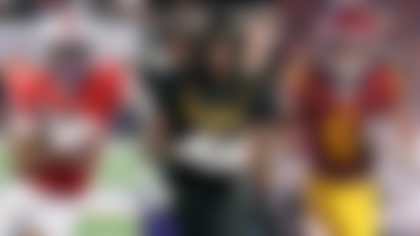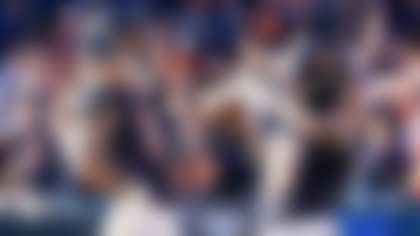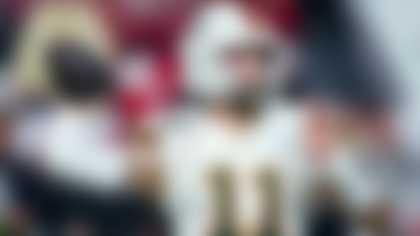The decision by an appeals court to reinstate Tom Brady's four-game suspension for his role in the Deflategate saga should come as no surprise to anybody who was in the courtroom for the March hearing. It was clear from the questions and comments of two judges on the three-member panel -- and the tone with which they were delivered -- that they had serious reservations about Brady's credibility, specifically the destruction of his cell phone while the investigation was ongoing, and about the NFLPA's efforts to scale back the powers given to the commissioner's office in the collective bargaining agreement.
Whether the harshness of Brady's penalty is appropriate is a matter that remains open to debate and probably hinges in some part on whether you believe the New England Patriots are serial envelope-pushers. But what the appeals court made clear -- in sometimes stinging language for the players' union -- is that the commissioner has wide latitude to impose punishments like this and that the only possible opportunity for the players to reign in those powers will come at the negotiating table.
The two judges in the majority opinion repeatedly hammered home a theme: "Here, the parties contracted in the CBA to specifically allow the Commissioner to sit as the arbitrator in all disputes brought pursuant to Article 46, Section 1(a). They did so knowing full well that the Commissioner had the sole power of determining what constitutes 'conduct detrimental,' and thus knowing that the Commissioner would have a stake both in the underlying discipline and in every arbitration brought pursuant to Section 1(a). Had the parties wished to restrict the Commissioner's authority, they could have fashioned a different agreement."
This is why the NFL moved so quickly when it first suspended Brady to have the case in the second circuit -- because, as one owner said at the time, league folks were confident that even if they lost at the district court level, as they did, they would prevail at the appeals court. The league wanted to avoid a legal precedent that would encourage the union to go to the courts when it disagreed with punishment meted out by the commissioner. For the league, the appeal was not so much about Brady -- although the optics of being at war with one of the greatest players in its history were certainly damaging -- as it was about preserving discipline powers. That level of confidence that the second circuit would back those powers is unlikely to change now until the collective bargaining agreement gets revamped.
"We are pleased the United States Court of Appeals for the Second Circuit ruled today that the Commissioner properly exercised his authority under the collective bargaining agreement to act in cases involving the integrity of the game," the league said in a statement. "That authority has been recognized by many courts and has been expressly incorporated into every collective bargaining agreement between the NFL and NFLPA for the past 40 years."
This is the second time in three weeks in which the league's powers were affirmed. The prior one came from an arbitrator's ruling that the powers given to the commissioner in the collective bargaining agreement extend to include putting players on paid leave as part of the exempt list, a key feature of the revamped personal conduct policy that the NFL created in the wake of the Ray Rice/Adrian Peterson/Greg Hardy tumult.
With word that talks between the league and the union toward a revised discipline policy that would allow other people into the process have all but collapsed, a scaling back of the commissioner's authority might be years away and will not come without a big concession from the union. It is worth remembering that, during the negotiations that led to the current agreement, the union gave up on changing the discipline structure rather quickly, with some union leaders believing -- not unreasonably -- that discipline affected such a small handful of players, it was not worth taking money out of the pockets of thousands of others. That is a bargain the players will have to make with themselves before they try to make it with the league -- what financial price are they willing to pay to guarantee the rights they seek?
What this means for Brady is more immediate. For now, he is suspended for the first four games of the regular season. (New England's slate during that span: at Arizona, vs. Miami, vs. Houston, vs. Buffalo.) He has appeal options, but they are narrowing and do not have a good chance of success. He can seek a stay while he exhausts those options, although it is seen by legal experts as a long shot that he would receive it. He can ask the full second circuit to review his case -- that is very rarely granted, even for decisions that were not unanimous, as this one was not (Chief Judge Robert Katzmann dissented). And he could appeal to the United States Supreme Court, although it is, again, a long shot that the high court would take the case. In a statement, the union reiterated that it did not believe Roger Goodell was a fair arbitrator and that Brady's rights were violated. But it gave no indication of its immediate plans for an appeal.
"So Tom Brady is almost out of chances," said Gabe Feldman, the director of the sports law program at the Tulane University Law School who is a legal analyst for the NFL Network. "I think any chance he has left is very slim."
There is, of course, the chance for a compromise between Brady and the league, although that seems remote, too. The league believed four games was appropriate when Brady was first suspended and did not reduce the suspension when Brady first appealed to Goodell last year. The league has the precedent it desired, but one league official who is well-versed in the Brady matter said he thought it was highly doubtful the league would settle now.
For the Patriots and Brady, there are perhaps only two small things to look forward to after today. Of the games Brady could miss at the start of the season, three of them are in Foxborough, a difficult place for opponents to play (see: two Pats home losses in the past three seasons combined). And more than a year after it began, the saga of underinflated footballs, destroyed cellphones and sullied reputations might finally be nearing its end. That would be good news for everyone.
Follow Judy Battista on Twitter @judybattista.












